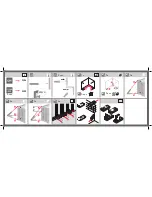
87
CVP-202
X
Select a style file.
..............................................................................................
• If a tempo is set prior to loading the
style, that tempo becomes the default
for the loaded style.
• Some styles are too large to preview
with the LISTEN function. In this case
the “Too much data for LISTEN func-
tion! Please load data.” message will
be displayed. If this happens, load the
style directly as in step 4.
• The Auto Accompaniment is automati-
cally turned on when the LOAD SIN-
GLE button is pressed, and the style is
played back automatically with the
Auto Accompaniment in C Major when
the LISTEN LCD button is pressed.
You can change the chord or try play-
ing on the keyboard while previewing a
style.
Select the desired style using the data dial or the
[–]
and
[+]
buttons.
You can preview the selected style by pressing the
LISTEN
LCD
button. (The
LISTEN
function is not available in the ALL LOAD dis-
play.) To stop listening, press the
LISTEN
LCD button again, or press
the
[START/STOP]
button.
• If the selected memory number already
contains a style, the name of that style
will appear above the MEMORY and
LOAD functions in the display. The
existing style will be overwritten when
a new style is loaded. (One pre-pro-
grammed temporary style is automati-
cally loaded into the [DISK/CUSTOM]
memory whenever the power is turned
on.)
Use the
MEMORY
LCD button to select the memory number to
which the selected style file is to be loaded (
1
through
4
), then press the
LOAD
LCD button to load the style file.
Repeat steps 2 and 3 to select and load other style files.
Using Style
C
Select a memory number and load the style.
....................
○ ○ ○ ○ ○ ○ ○ ○ ○ ○ ○ ○ ○ ○ ○ ○ ○ ○ ○ ○ ○ ○ ○ ○ ○ ○ ○ ○ ○ ○ ○ ○ ○ ○ ○ ○ ○ ○ ○ ○ ○ ○ ○ ○ ○
It is not necessary to select a memory number when
ALL LOAD
is
selected in step 1. Simply press
OK
to load or
CANCEL
to abort.
If there is not enough memory to load the specified style file, the
“
Not enough memory! Delete an unneeded style?
” mes-
sage will be displayed. In this case it will be necessary to delete a style
you don’t need before loading the new style. Use the
MEMORY No.
▼
and
▲
buttons to select the number of the style you want to delete, then
press
DELETE
to delete the style, or
CANCEL
to abort.
• The ALL LOAD display is as follows:
When ALL LOAD is executed, all data
in the four memories will be replaced
by new data.
• The amount of memory being used by
each style is displayed next to the style
name (in approximate kilobytes). You
can refer to this amount to judge how
much memory (out of the total 100 KB)
will become available when a particular
style is deleted.
85
















































